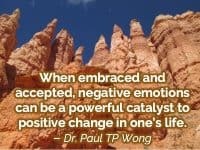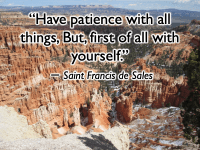Tina Hallis's Blog, page 17
May 10, 2020
There’s So Much I Can’t Do! I Can’t Even Go to the Hair Salon

Isn’t it fascinating how easy it is to focus on all the things we can no longer do because of the current situation?
I can’t get my hair cut at the salon.
I can’t go out to eat for Mother’s Day.
I can’t invite friends over for dinner and games.
I can’t get booked to speak at live conferences or do live workshops at companies.
I can’t go shopping with my daughter at a clothing store.
I can’t go to the movie theater, a play, a sports game, or a live performance.
There are so many things I can’t do, it feels like I can’t live my life; at least not like I used to. When I focus on all these things, it makes me discouraged and frustrated. It makes me feel helpless and hopeless. But when I purposely shift my thinking, I realize . . .
I can still have a family member cut my hair (WHAT??) or I can wear a hat or put it in a ponytail.
I can still pick up food at a local restaurant.
I can still get the groceries and necessities I need at a store (at least most of what I need).
I can still connect with friends by phone, video chat, messaging, email, or maybe even outside from a safe distance.
I can still speak at virtual conferences and do virtual workshops for companies.
I can still spend time in my yard and garden, mowing, planting, and enjoying the flowers.
I can still go for walks and enjoy the sunshine and fresh spring air.
I can still watch movies, play games, do crafts, and have fun with my husband and daughter.
I can still sort through my closets and cupboards and declutter my home.
I can still look for the opportunities, the silver lining, the good things that come from reassessing my life and my priorities.
Now I feel grateful, happier, and hopeful.
Make a list; what are all the things you can still do?
May 3, 2020
How Are Your “Stuck at Home” Relationships?

Many of us have been living in close quarters with some of our family for several weeks now. After a while, even people we love and enjoy can get on our nerves, especially when we’re feeling excessive stress. Misunderstandings or differences in opinions can erupt into arguments or hurt feelings. Has this happened to you?
These past several weeks I’ve had a few opportunities to use some of the great insights I learned while developing my online course on how to build our immunity to people’s negativity. Life is so much easier when I remember to use the “Pause, Notice, Choose” steps! And I’ve seen what happens when I just react. Yikes!
I’ve found this approach not only works great in the moment (like when my daughter is upset with me but doesn’t want to talk about it), it’s also handy when I’m telling myself a story about the other person. For example, my husband and I had a disagreement about how to train our dog. Later, I paused and noticed that I had some interesting stories in my head. I noticed that my ego wanted me to be right. I also noticed that I expected him to be mad and want to prove me wrong.
I finally made it to the “choose” step and thought about what would make the situation better. I realized it wasn’t about who was wrong or right; it was about acknowledging that we’re both human. The most important thing was our love for each other and the strength of our relationship. Once I made this “internal choice,” it was easier to find the right words to convey how I felt.
If you’re struggling with your “stuck at home” relationships, consider trying pausing, noticing, and then choosing the best response. Here are some tips for practicing this approach on the easy stuff.
April 26, 2020
The Difference Between Suppressing Bad Feelings and Shifting Our Thinking

This past week, I was talking with a manager who, like so many of us, is now working from home. She shared that she actually enjoys her new situation. She enjoys the flexibility and the opportunity to spend more time with her little ones and her spouse. She enjoys the slower pace of her usually busy life. And she’s finding a new sense of priorities in her life. She commented how she has it so good compared to so many other people who are struggling to work remotely.
And yet, she still feels incredibly stressed! She apologized to me, saying she “must be weird” for feeling this way considering all the positives in her life right now. I told her she sounded completely normal. I shared what I’ve learned from Positive Psychology and explained that her feelings are a perfect example of how our brains are wired to focus on the negative, whether it’s something that happened in the past, is happening now, or might happen in the future. I also told her she shouldn’t feel weird or bad for being so stressed.
As I thought about our conversation, it reminded me how we often hear that we shouldn’t suppress or judge our negative emotions. I used to be confused about how this advice fits with the idea that we can choose our thoughts and shift our thinking away from bad feelings. But as I’ve learned more and noticed these experiences in my own life, I’ve started to realize the difference.
Avoiding and judging certain emotions means we see them as bad and think that it’s bad to have them. We might even think we’re a bad person if we experience them. So instead, we try to pretend they don’t exist. But these feelings aren’t bad. They’re there to give us information, and if we don’t acknowledge them, we miss out on their valuable message.
For example, being stressed commonly means we need to change something. It could be changing a situation we don’t like by finding a different approach in what we’re doing or in what we’re thinking; it could be changing a relationship by having a critical conversation; it could be changing our expectations by having a conversation with ourselves, and the list goes on.
The problem is that we can get stuck replaying the thoughts that make us worried and stressed. After we figure out the message, we need to shift our thinking and let go of the negative thoughts. Letting go is much easier if we’re also taking good care of ourselves and keeping our positivity battery charged.
What feelings do you need to acknowledge and “listen” to?
April 19, 2020
Ways to Have Virtual Fun with Family & Friends

With social distancing, how can we still have fun with our family and friends we can’t see in-person? It may seem challenging, but I’ve been doing some research and brainstorming to find some easy ideas.
First, choose a free video chat platform to connect and see each other. Possibilities include Face Time, Zoom, Google Duo, What’s App, Skype, and House Party (it has a few built-in games). Here are some ideas of what you can do together to get you started.
Share photos and memories together. They could be from times together or ones from long ago. Will they recognize you in your 6th-grade picture?
Have a virtual potluck where everyone brings a favorite dish they made and the recipe. So many of us are cooking from home more and could use more ideas of what to make.
Have a dance party! Maybe you even choose a decade and genre so you can dress the part.
Try a traditional game like Pictionary or charades. You may want a stand or tripod set up if you’re using a phone or tablet.
Use a platform like http://playingcards.io/ that synchronizes players’ movements for games like Euchre, Checkers, Crazy Eights, Go Fish, and Remote Insensitivity (think “Cards Against Humanity”). You can chat during the game over the phone or use one of the video chat platforms listed above.
Make your own fun BINGO cards. Choose a theme like photos of family members or friends, or choose words from your group’s favorite movie or TV show. Ask for words or images from the group or do it yourself. Then share a picture of the BINGO card you’ve created that they can print or display on their device. Use buttons or coins to mark spots on the paper or load the image of the BINGO card into a photo editing app that you can mark up. Share the list of words or images so a different member of your group can call out names or words for each game.
These difficult and wild times can feel serious and maddening, but you can lighten the mood and release some stress by taking time to have fun, even if it’s virtual. Pick two to try this week and let me know how it goes. I’d also love to hear what other ideas you have!
April 12, 2020
Make All of This a Little Easier – Spend More Time Visiting Optimism

Have you noticed how easy it is to bounce between emotions these days? Maybe it’s anxiety for the state of the economy and our finances, helplessness for the end of the pandemic, gratitude for the medical professionals taking care of our sick, optimism that things will get better soon . . .
I would like to invite you to visit optimism more often. It may be hard to stay there, but you can intentionally make a few extra trips.
There is a concept introduced by the father of Positive Psychology, Martin Seligman, call “learned optimism.” Interestingly, Prof. Seligman had been working on learned helplessness at the time. But he wondered why some people didn’t feel helpless, even when a stressful situation reinforced their lack of control. So he started to look into how individuals could become be more optimistic.
One key practice he found is to change how we talk to ourselves. To spend more time in optimism, we can remind ourselves that –
The current situation is temporary, not permanent. Things will get better. They may be different than before but they will improve over how they are now.
We are strong and resilient. We’ve been through difficult times before and we have survived. In fact, our struggles have taught us a lot about ourselves and have made us stronger. This will too.
There is still a lot we can control. We can control how much we watch the news, what we do with our spare time (for those who have some), and what we focus on.
We are all in this together. Although our situations may be different, we are all affected in a variety of ways.
There is good news related to the pandemic. Even though you might now see much of it in the regular news, just search “good news” and coronavirus or COVID-19.
It’s totally normal to feel stressed and frustrated with all that’s happening, but take this challenge to purposely add more optimism to your day. It’s so good for your physical, mental, and emotional health! AND it makes all of this a little easier.
April 4, 2020
What’s the Most Important Trait We Need During These Times?

As I thought about this question, the first things that came to my mind were perseverance, optimism, or determination. But as I considered the situation more deeply, I decided that, based on what I’ve seen and experienced, there is another trait we all need to build and use during these extremely challenging times; and that is PATIENCE!
Everywhere I turn, I see examples where a little more patience would make a big difference.
Patience with other people’s reactions to the extreme stress, whether it surfaces in the form of catastrophic thinking, rudeness, sadness, blame, etc. We are all different and process what’s happening in different ways.
Patience with the inconvenience of social distancing. This is impacting all of us so we have to find peace and acceptance until things get better.
Patience with other people in our household. Suddenly many of us are spending TONS of time together in close quarters. This can definitely cause us to get on each other’s nerves and breed impatience.
Patience with ourselves. It’s normal to go through a rollercoaster of emotions as we try to find our way through this mess. Some days may be much harder than others.
Here are a few things that are helping me.
Pausing before I respond.
Taking several deep breaths.
Just staying quiet instead of voicing what comes to my mind.
Reminding myself that this is hard on all of us, some more than others.
Trying to keep my “positivity battery” charged so I have more internal resources available.
Focusing on the present moment vs. worrying about the future.
See if you can find opportunities to practice and use your patience this week. The great thing is that it’s easier for other people to be patient if we are patient with them first.
March 29, 2020
Laughter, Music, & Friends – Great Antidotes for Relieving Stress

There are so many reasons to feel stressed, whether you’re frustrated as you try to figure out how to work from home, anxious as you try to stay safe because you have to be at work, or wish you still had your work and wonder how you’re going to pay your bills. Of course, there’s also our concern for the health of our loved ones, the economy, and the world as a whole. In the face of all this worry, how can you find at least a few moments of peace or even happiness?
Despite what’s going on, it’s so important to take time to find things that make you feel good. If you let yourself get stuck watching the news, worrying about the future, and constantly discussing the problems, it can send you into a downward spiral that casts a dark shadow over every part of your life. It breeds feelings of helplessness, hopelessness, discouragement, and the list goes on.
Here are just three ideas that can help;
Find reasons to laugh. Whether it’s funny videos, reruns of your favorite sitcom, silly jokes or memes on social media, or sharing funny memories with friends, there are lots of opportunities to find something that tickles your funny bone.
Listen to music. Choose songs that lift your spirits, inspire you, energize you, or fill you with gratitude. Avoid melancholy songs that can fuel feelings of loss or sadness.
Connect with friends. Even if you can’t get together in person, be intentional about reaching out with email, messaging, social media, and the phone. Use Skype, Zoom, Facetime or whatever platform you have for enjoying a virtual face-to-face experience. Our social connections are so important for our overall wellbeing!
Try some of these antidotes today!
Of course, there are many other ways to add moments of peace and happiness. I would love to hear some of your favorites. I will create a long list to share next week so that it’s super easy to find more ideas.
March 22, 2020
Some People Are Struggling with Stress & Fear. BUT NOT YOU!

There’s immense change and uncertainty going on right now, and it’s probably going to stay that way for a while.
Some people are struggling with overwhelming stress and fear because of what’s happening. Some will suffer from post-traumatic stress after all this is over.
BUT NOT YOU!
You know it’s hard when you’re in the middle of incredible change and chaos. But you’re able to find peace with the unknown because you know you’re going to come out stronger on the other side. You know you’ll survive this because you’ve made it through hard stuff before. You also know about post-traumatic growth and that post-traumatic growth is actually more common than PTSD.
Some people are so focused on what’s changing, what they can’t do, and what they’re losing that they’re immersed in anxiety, anger, and sadness.
BUT NOT YOU!
You intentionally shift your thinking to remember the many things you can still do, the things you still have, and all there is to be grateful for. Instead of getting stuck in a downward spiral, you use this time to build relationships, learn new things, take care of yourself, and find ways to help others.
Some people can only talk about how bad things are, spreading feelings of hopelessness to others.
BUT NOT YOU!
You uplift others and help them see beyond this mess. You’re a positivity catalyst that spreads calm in the face of the unknown. Just talking to you helps people to feel their best, do their best, and be their best.
Some people don’t know how to manage their skyrocketing stress. They either never learned or can’t remember strategies that can help them find more calm and peace.
BUT NOT YOU!
You understand that uncertainty triggers a strong threat response in our brains that causes us to anticipate the worst possible outcome. So, you catch yourself when that happens and use a variety of tools to lower your stress because you know it’s important to avoid a downward spiral of negative thoughts. You take the time to care for yourself and build up your internal resources.
Many people can only see this crisis as bad, upsetting their lives, their finances, their plans, their future.
BUT NOT YOU!
You can see past all the “bad” that’s happening and also see the benefits this change can have. For some of us, this pandemic has slowed down our busy lives, it has lowered pollution because of less travel, it’s given us the opportunity to reflect on what’s really important in our lives, and it’s uniting us as a country and as a world against a common foe.
Many people are going to get impatient and say things that hurt others, damage relationships and create division because their stress has impacted their self-control and compassion.
BUT NOT YOU!
You’re tapping into (and replenishing) your reserves of willpower and resilience. You know that people are struggling with hopelessness, discouragement, and frustration so you remember to come from a place of empathy and understanding.
I’ve found it helpful to reflect on this idea –
Life is not about waiting for the storm to pass; It’s about learning to dance in the rain.” —Vivian Greene
March 15, 2020
How to Find More Calm When Life is Anything But

During these turbulent times, my mind is constantly trying to process all the changes happening in the world, our country, and our community. There is so much uncertainty and fear, it can feel like I’m in a roller coaster that’s taking me over crazy hills and dips while I’m in a dark tunnel, not seeing what’s coming next.
If you’re having a similar experience, you’ll appreciate the following tips that can help you find more calm despite all the chaos and unknowns.
Know that your brain interprets uncertainty as a threat and will tell you that you’re in serious danger. No wonder our stress levels skyrocket! Recognize that this is normal. When you notice it happening, thank your brain and decide if your thoughts and feelings are helpful or if you need to shift.
Prepare and plan as best as you can, knowing that you may have to constantly adjust. Don’t obsess. Try to focus on the things that are within your control. Writing out your plans or discussing them with a helpful friend can reduce your worry.
Reach out to others. Your community of friends and family can be a big asset during these tough times. Lean on each other. Ask for help, even if it’s just sharing your worries. Offer your help to others. Be sure to include “good things” in your conversations, too.
Manage waves of stress by taking several deep, slow breaths to lower your heart rate and blood pressure.
Have a conversation with yourself, reminding yourself that you will get through this. There may be challenges, but you will learn and grow and move forward.
Disconnect from the news for periods of time and add things to your day that help you relax and make you feel better. Examples could be playing certain songs, spending time with your pet, getting outside for a walk, meditating or praying, connecting with friends and family, enjoying a favorite hobby, etc.
It’s easy (and normal) to dwell on all of the scary unknowns. But this is also an opportunity to think about all the things we take for granted in our daily lives (like buying toilet paper at the store ?). It’s also an opportunity to reflect on what really matters, like family and friends and living our values even when it’s challenging.
We are witnessing a time that will go down in history. You can spend this time letting the default stress and fear rule your mind, or you can purposely find ways to add more peace.
March 8, 2020
I Felt Like a Fool! Now it’s a gift that makes me laugh

I was getting extremely frustrated! I was honking my horn and flashing my lights, but the school bus wouldn’t stop to let my daughter off!! How could they not notice me?
The last few years, we’d been meeting the bus at a crossroads after school so our daughter wouldn’t have to be the last one off and spend over an hour riding the bus home. This particular day I was feeling stressed because I was running late to the rendezvous point. As I crested the hill on our country road, I could see the bus down in the valley, already leaving our stop. Darn! So I chased after them. But despite my efforts, when they reached the next stop, my daughter did not get off. What the heck was going on??
Then I saw it. A sinking feeling hit the pit of my stomach. Another school bus was coming towards us from the opposite direction. Could that be her bus? In my panic of being late, I hadn’t paid attention to the bus number. I quickly turned around and followed it. Sure enough, it stopped at our normal meeting spot and my daughter hopped off.
I felt so humiliated and embarrassed! That other driver must think I’m crazy!! My first reaction was to pretend that it had never happened and to never tell anyone. But then I thought of how funny it would seem to someone watching. “Crazy Mom Stalks Bus!” What if I had gotten out of my car and walked up to the bus and confronted the driver? Oh my!!
So I shared the story with my daughter. We had a great laugh! Every once in a while one of us brings it up and we have another laugh.
What if we could get better at seeing the amusement in these embarrassing situations? Suddenly they go from a memory we want to forget to a funny moment that bonds us in laughter. Keep an eye out for opportunities to laugh at yourself. Be sure to share them with others.



